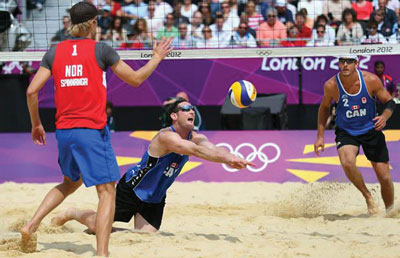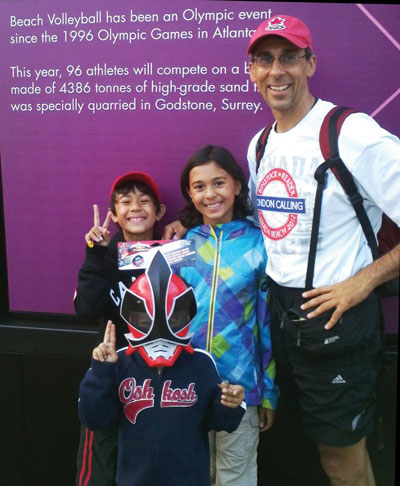
I was first introduced to the concept that our health is positively impacted when we have a better relationship with ourselves
I was first introduced to the concept that our health is positively impacted when we have a better relationship with ourselves, and in turn a better relationship with others, as a chiropractic patient, and then again later while attending a chiropractic seminar as a student of the Canadian Memorial Chiropractic College (CMCC). When I eventually played professional beach volleyball, I experienced how important this concept was, especially in a sport where you have to have complete reliance on your partner to be able to play the game, at all, let alone win the next point. Before I had an understanding of any of my own feelings, thoughts and perceived challenges, I was unable to relate in a healthy way to my beach volleyball partner – and vice versa – and this would inevitably sabotage our game.
 |
|
| The beach volleyball venue at the 2012 Summer Olympic Games in London, England. Advertisement
|
This relationship reliance can be seen in the performance of Mark Heese and John Child, Canada’s Olympic beach volleyball bronze medalists at the Atlanta Olympics in 1996. After getting pummelled in their first Olympic game (the score was 15-1), Mark Heese recalls it as “the worst performance of my life.” But he shared that the reason they were able to do so well in the games that followed was because of the strength of their trust and belief in one another. John Child – who had watched Mark, his shorter partner and teammate, get picked on throughout the whole game and, subsequently, buckle under pressure – shared publicly after the match that “his trust in Mark never waned once . . . . I knew Mark was a good player and I had no reason to doubt him.” This came from John having a healthy relationship with himself first – in not letting doubt get the best of him.
Mark and John ended up winning their next six matches on the way to claiming a bronze at the Atlanta Olympics. Some of the work they did, which was unique from the other players at that time, included hiring of relationship coach to help them learn to better relate to themselves and each other on the court.
Years later, when I heard Dr. Josh Binstock, a CMCC graduate and fellow beach volleyball devotee, also had a dream to make it to the Olympic Games, I couldn’t resist contacting him to help him with his Olympic goal. I had had that dream myself, before a physical diagnosis started me on my chiropractic path. I called him and, over lunch, we connected. Our clinic decided to sponsor him and, of course, after his spinal checkup, I started adjusting him too.
Four months later, and seven months before the summer London 2012 Olympics, Josh called, and shared that the relationship with the beach volleyball partner he had committed to his Olympic journey with, had dissolved. He had found a new beach partner, and asked if, this time, I would consider coaching them. The coaching required was similar to the relationship coaching that Mark and John had used to tweak their relationship for the Atlanta Olympics.
I agreed.
Workshopping the relationships
And so began the weekly, one-hour meetings between Josh, myself and his new partner, Martin Reader from Comox, B.C. Our goal was simple and that was to: first strengthen the relationship they had with themselves and their commitment to their Olympic goal; and then, in turn, strengthen the relationship they had to each other and all those in support of their Olympic goal.
 |
|
| The 2012 Canadian Olympic volleyball team, Dr. Josh Binstock (DC) and Martin Reader, compete in London.
|
So, along with weekly adjustments, we began working on their performance by identifying internal blocks – the most important of these were the “experienced hurts.” Having competed against each other for some time, they knew one another, but didn’t know, deep down, what made the other “tick,” or “get ticked.” Together we labelled strengths and weaknesses, likes and dislikes, both about one another personally and the game. Under the umbrella of commitment, honesty and participation we explored challenges they faced with nagging injuries, financial stresses, external distractions and relationship hurts, which included feeling put down, let down or shut down.
We also worked on building a clearer vision so that the force of innate, that we know so well in chiropractic, could continue to lead them towards their dream and destiny. This work was important, especially during the weeks leading up to the Games when they would experience a higher degree of distraction and adversity.
BRIEF Training
Another aspect of our relationship training involved teaching them how to build awareness around their “BRIEF,” an acronym for belief, ritual, intensity, emotional awareness and focus. When one’s BRIEF is strong, rather than reacting to outcomes (for example, a lost game), one is redirected from their awareness of outside-in, to an awareness of inside-out. As well, they learned that when communicating with BRIEF it allowed them to build a healthier relationship within the partnership. Part of the BRIEF training involved developing stronger daily rituals, including morning-time movement, meditation, prayer, and journaling, as well as pre-game warm-up routines. I also helped them strengthen their emotional awareness by better learning to express their hurts. This skill is cultivated through meditation, which we would practice in 15-minute cycles during acts of eating, sitting or walking.
Typically, after each one-hour session, there was more clarity of purpose, increased focus, and, most importantly, a better relationship with themselves, so they could have a better relationship with each other, in order to train with intensity and belief and move together towards their shared Olympic goal.
The results
Their hard work and training paid off. Although they had a difficult early season on the pro-Federation Internationale de Volleyball (FIVB) tour, and even some injuries, they persevered for a personal best ninth-place finish in Poland and qualification to three grand-slam tournament events. Their relationship skills were growing stronger with each game played – this was evident when they beat Mexico in a three-set heated thriller (15-13 final set), to give Canada the Olympic bid, in front of a deafening Mexican crowd. Now all they had to do was beat, on home soil, last year’s Canadian Beach Volleyball Champions. This was the last step of their journey, as the winner would represent Canada at the London Olympic Games. In a hard-fought two-set match, in front of a jammed Ashbridges Bay crowd in Toronto, they won and, with that win, their dream (and mine, too!) to reach the Olympics had come true!
It was a gift to be at the London Games along with my family, and meet so many of the athletes representing their countries. Witnessing the kind of relationships they had with themselves, their teammates, and families was also amazing. As well, it was wonderful to see so many athletes, knowing that so many of them were being adjusted by their chiropractors. It was great to watch their nervous systems functioning at their optimum levels, ultimately allowing them to better relate to themselves, and their surroundings, in competition.
It was such a blessing to be a part of it.

|
|
Dr. C. Gus Tsiapalis, president of TeamChiropracticGTA.com, sleep expert advisor and chiropractic coach, has been providing family wellness chiropractic care in Vaughan, Ont., since 1999. Prior to opening his wellness centre, he was a full-time locum doctor and worked in over 30 different chiropractic centres throughout Ontario. He has been helping make subluxation a household word since graduating in 1995, and now brings a special focus to Relationship Skills Building in Chiropractic. To learn more about these topics, e-mail dr.gus@vaughanchiropractic.com.
Print this page